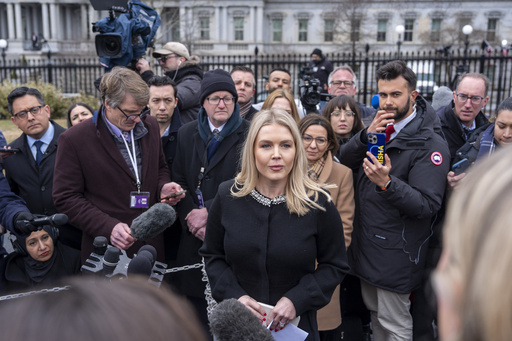WASHINGTON — On Thursday, President Donald Trump is holding a private meeting with Republican lawmakers at the White House amid ongoing disagreements among his allies in Congress over the specifics of his proposed legislation aimed at reducing taxes, regulations, and government spending.
House and Senate leaders in the GOP are looking to Trump for guidance on the next steps, but so far, the President has not committed to any particular details, favoring results instead. This deadlock has caused frustration among Republicans, as they are running out of time to advance what has been their main agenda while they hold power in Washington. Meanwhile, phone lines in Congress are buzzing with calls from constituents who oppose the President’s budget-cutting initiatives, particularly those spearheaded by billionaire Elon Musk that target federal programs and services.
White House press secretary Karoline Leavitt conveyed that the discussions focused on the “tax priorities of the Trump administration,” highlighting promises to eliminate federal taxes on tips, Social Security benefits, and overtime pay. Renewing the tax cuts initiated by Trump in 2017 was also on the meeting agenda. “The president is committed to working with Congress to get this done,” Leavitt noted.
Speaker of the House Mike Johnson, despite having a narrow majority, has emphasized that Republicans will present a united front and aims to pass the legislation through the House by April. However, as deadlines loom and the House had hoped to begin budget hearings this week, the Senate appears to be taking a more proactive stance.
Under the leadership of Senate Majority Leader John Thune from South Dakota, Republicans have suggested a two-step strategy, beginning with a smaller bill that would encompass funding for Trump’s border wall and deportation plans, alongside other legislative priorities. Following this initial step, they would aim to pursue a broader package that extends tax breaks ahead of a year-end deadline.
Senate Budget Committee Chairman Lindsey Graham announced plans to advance hearings next week to kick off this process. His proposed initial bill is estimated at around $300 billion, which would include funding for border security and an increase in defense spending, primarily offset by cuts to green energy programs introduced during the Biden administration. Graham asserted that this funding would give the Trump administration the necessary resources to “finish the wall, hire ICE agents to deport criminal illegal immigrants, and create more detention beds to prevent releasing potentially dangerous individuals into society.”
Graham boldly claimed, “This will be the most transformational border security bill in the history of our country.” This proposal, however, significantly diverges from the more than $3 trillion in tax cuts and over $2 trillion in spending reductions that some hardline conservatives are demanding.
Within the House, Republicans are facing considerable divisions regarding Graham’s plan, and there are further disagreements on their own proposals. House GOP leadership suggests around $1 trillion in savings over the next decade, although members of the conservative House Freedom Caucus are pushing for at least double that figure. Representative Chip Roy from Texas criticized the prospect of achieving merely $100 billion in savings amidst an annual spending level of $7 trillion, labeling it as “insane.”
While some in the Freedom Caucus are intrigued by Graham’s approach as a preliminary step towards Trump’s immigration and deportation objectives, others, like Texas Representative Jodey Arrington, the chairman of the House Budget Committee, consider the $2.5 trillion in spending cuts a “stretch goal.”
For Johnson, achieving near-total support within his party ranks is crucial to pass any legislation, especially facing potential pushback from Democrats. Over in the Senate, Republicans maintain a slim 53-47 majority with minimal room for dissent. Trump has often reiterated that he is more focused on the results and the achievement of his policy objectives than on the legislative process itself.
